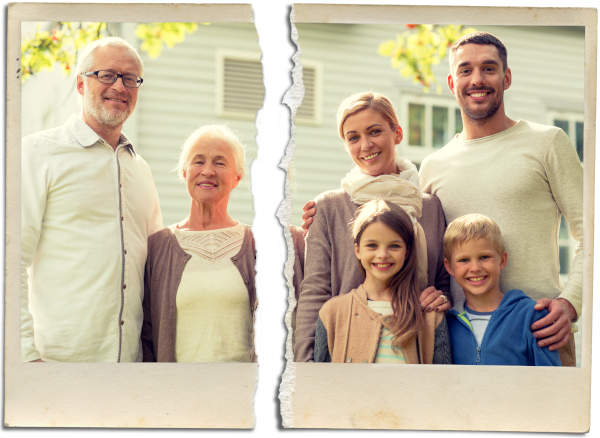Brenda clutches a small picture frame in her hands—a 5×7 photo of three smiling grandkids, ages five, three, and nine months. This is one of those talking frames, where someone can record a message that plays at the push of a button. Brenda presses the button and hears something that’s all-too-familiar: two voices trying to speak in unison and one talking gibberish. After several hundred times listening to the message, Brenda knows very well what they’re saying: “Happy birthday, Gram! We miss you. We love you.” She can’t help but smile.
But then she wipes a tear from one eye. Brenda and her husband Gene have seven grandchildren and deeply love all of them, but now grandparenthood is an awkward mix of joy and pain.

Their other four grandchildren—from two of their three adult children—bring about a lot of the joy they experience as grandparents. They’re together for holidays and occasional vacations, pay regular visits, have consistent positive interactions with the grandkids, attend some sports and music events, and sometimes babysit so the parents can go on dates or weekend getaways. Any tensions and disagreements are relatively small.
The painful part for Brenda and Gene is related to the three children pictured and heard in the talking frame, whom they haven’t seen for more than four years. For about six years, things seemed great with those grandkids and their parents. Then something changed. Complex issues and deep hurts surfaced between Gene and Brenda and their adult daughter, and although they tried, they couldn’t come to a resolution. The daughter and her family separated and made it clear that they no longer want a relationship, and Gene and Brenda should not try to see or contact the grandkids.
They have never had delusions about being perfect parents or grandparents, but they also never imagined that something like this could happen. They still struggle to understand how it did happen.
It’s surprising how many grandparents have similar stories to tell, although each story has some different twists and turns. It’s evidence that relationships are often complicated, and can be messy and difficult. Wise grandparents will do everything they can to make peace with their adult children and their spouses, but sometimes there’s nothing more that can be done, and they’re left with the questions and the pain.
Grandparents describe this kind of estrangement as being like experiencing five or six deaths in the family all at once. If they have had some time with their grandkids in the past, there are numerous reminders of those better times—photographs, videos, gifts and other mementos, or places they spent time together like parks or schools, churches or ice cream parlors. Holidays, birthdays and anniversaries can be difficult for similar reasons.
The grandparents are left wondering, What are our grandchildren thinking and feeling about us? Deep down, are the little girls and boys who we loved so much—and who seemed to love us—still there somewhere? Do they even remember the good times? Or were they hiding something all that time? What do our children and grandchildren say about us to their friends? Don’t they see any value in the role we have played in their lives?
Sometimes there are also questions like: Where do they live? What are they doing with their lives? Maybe a few details come through mutual friends or on Facebook, and that starts another round of difficult questions: How many other people know more about my own children and grandchildren than I do, and what kind of sense does that make?
Eventually, it’s inevitable to start asking another set of questions: What if one of us or someone else in the family has a serious ailment or dies? Wouldn’t these children and grandchildren want to know? Should we make adjustments to our will and estate documents?
These kinds of difficult questions are constant and sometimes all-consuming through this process—which truly is a lot like grieving deaths in the family. But since this separation doesn’t actually involve a death, in some ways it’s worse, because there’s no closure or sense of finality in those relationships. Will things stay this way for the rest of our lives, or will something happen one day that opens the door to some kind of relationship? Sometimes the most difficult part is that there are really no answers available, and the grandparents have to find a way to stop thinking about it and move forward.
If you are in a similar situation, how do you move forward?
There are some grandparents who keep trying to maintain a relationship in defiance of their children and in-laws. They show up at events uninvited, send cards and gifts after being asked not to, and try to contact their grandkids in any way possible—while the parents keep trying to prevent it. While that approach may bring a few fleeting moments of satisfaction, the overall effect will likely be greater animosity and heartache.
So here are some suggestions from grandparents who have been estranged from their children and grandchildren, who are trying to make the best of it despite the separation.
Get back to the basics.
Focus on the foundational truths that you embrace and that bring deep meaning to your life, and pursue them with purpose and passion. One couple draws great strength from their faith in God and the Scriptures, and they cling to that faith all the more fiercely. It might be something different that grounds you and gives you peace and hope. Nothing can take those things from you, and it’s important to keep them vital and meaningful in your life.
If you’re married, deepen that relationship.
Traumatic challenges, like losing a child to death or estrangement, drastically increase the chances of divorce. The husband and wife process their grief in different ways and at different rates, and often struggle to provide the needed support and encouragement to one another. So, even if you have a strong marriage, it will need to grow during this challenge. Do all you can to stay married and encourage your children to stay married. Divorce can take a difficult situation and make it devastating.
Cherish encouragement from others.
You have friends and possibly other family members who still believe in you, who may share your confusion and empathize with your pain. Maybe some of them are members of a church or community group with you. In the past, it was easy to take their support and words of reassurance for granted. But for significant challenges like this, you can’t be too proud to lean on them and really depend on their friendship.
Also, be intentional about meeting with other grandparents. We all have our challenges and struggles during this season of life, and we should be listening to each other, praying together and offering comfort. Some cities have organized support groups for alienated grandparents.
Find others to invest in.
If you have other children and grandchildren, continue to offer them your very best. Maybe that’s obvious. But don’t forget about other children around you. If you stop and think for a minute, there are probably numerous kids nearby—in your neighborhood, church, or through other acquaintances—who would love to soak up some of your love, your wisdom, and simply your attention. When you start viewing “grandparenting” as a bigger role, you’ll start seeing all kinds of opportunities to live it out.
This can also extend even more broadly. Maybe you have wanted to get involved in mentoring relationships, volunteering for a charity organization, or taking on a leadership role in a group where you’re already involved. However you express it, making a difference for someone else is a great reminder that, no matter what the relationships with your children and grandchildren may be like, you have a lot to offer other people during this phase of your life. And you’ll gain strength in the process.
Be patient.
As difficult as it is to go through life without a sense of closure with regard to your estranged children and grandchildren, you just never know what the future will bring. Sometimes it takes time for good things to happen. Maybe your son or daughter’s family will face a crisis or some other situation that causes them to see things differently. Maybe your grandchild will reach college age and want to renew the connection to you. There are no guarantees, but things could change for the better.
To help deal with the difficulties, some grandparents create a memory book or a “someday stash.” They put aside photos, keepsakes and gifts for their grandkids in preparation for a reunion that could happen at some point in the future. They may even write letters and save mementos of this period in their lives that they can give to their grandkids … someday. For some grandparents, these projects help give them hope and optimism; others may see them as constant reminders of their pain and sadness.
The difficult emotions and questions will always be there to some degree. The goal is to find a positive way to move forward in the meantime. Be the person God has called you to be in every other area of your life. As hard as your situation is, continue praying for that family and keep the door open to better things ahead.






